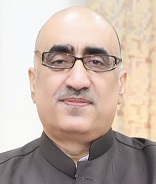Dr Liaqat Ali
A very striking news regarding health policy appeared a few weeks back and disappeared due to the new climate, political and war theatre stories that Pakistan has the world highest prevalence of Diabetes Mellitus in the world. Some 33 million Pakistanis – 26% of adult population are living with diabetes according to the data of International Diabetes Federation. But who cares, after the 18th Amendment and abolishing the concurrent list, health is considered as a provincial chapter. Unfortunately, all of four federating units have failed to raise community awareness about this potential catastrophic disease which is considered as ‘mother of all diseases’ in medical literature. The federal government still control the accrediting and regulating bodies like PM&DC with little or no control on diverse navigation of medical curriculum. Majority of the countries have adopted the SPICES model where ‘C’ stands for community-based medical education.
There are two important concepts in medical education. Number one is the ‘Ivory Tower’ model of healthcare system where governments invest billions of finances on building huge, multistory, and ever expanding tertiary care hospitals. We had inherited this model from the UK after the Independence in 1947. We never thought that the colonial United Kingdom was rich and was able to afford ivory tower model. With the passage of time, this model of healthcare fell victim to the conspiracy of market forces and bureaucracy. If we do detail analysis of healthcare system in all the federating units of Pakistan, we would see ivory towers in flagship programs in Punjab, public-private-partnership in Sindh, grinding of resources in Sehat Sahulat Program in KP, and enigmatic schemes in Balochistan. All the ivory tower programs have political optics of hi-tech equipment, robotics, advance genetic labs and free treatment as slogans for coming general elections. Even any sane person can bet that these programs are never free.
The second model of healthcare is the ‘Community Oriented Model’. This model was adopted by Iran and Cuba. This model has probably enabled Iran to run its healthcare system very successfully even in suffocating sanctions for more than four decades. In this model, the graduating doctors are first placed in periphery with good incentives and early chance of merit of doing specialization in subsequent years. The community oriented model emphasizes on the prevention and availability of healthcare at door step for common illnesses even in the remote rural areas. The patients needing specialized treatment are referred to few of tertiary care hospitals. The specialized hospitals are developed in bigger cities under sustainable development program.
Contrary to this, the poor triage and referral system in Pakistan put a major brunt on tertiary care hospitals where even the training slots of residents are used as source of stipend for three years. Sadly, a patient of acute appendicitis leave DHQ Parachinar, crosses Tall, Hungu and Kohat, trespassing qualified general surgeons in respective districts and reaches Peshawar to be operated in night either by a house surgeon or a postgraduate resident.
For instance, we need Pakistan Institute of Community Urology that can coordinate, monitor and cater all the patients of urology at near boarder facilities in KP. This community oriented model can raise awareness regarding high prevalence of complications of diabetes like chronic kidney diseases, early diagnosis and preventive strategies of renal tract stone diseases, and stopping the injudicious use of antibiotics and its role in urinary microbiome formation in causing stone disease.
We may not be able to control the catastrophic climate change due to global warming, but we can raise awareness regarding cessation of smoking, chewing tobacco, and snuff etc. and can definitely reduce all sort of cancers, especially urological cancers.
Well, the near boarder urological centers will cater the minor urological illnesses at door step thus prolonging the life of tertiary care hospital like the Institute of Kidney Diseases (IKD) for complex surgeries and advance procedures.
So, it is high time to redefine our health policies, as the trained, skilled and genius young medical professionals have opted for brain drain due to limited opportunities in the existing healthcare system in the country, while this brain drain is an important social parameter of assessing the sense of uncertainty of the future of the younger generation of doctors.
The writer is a senior clinician, medical educator, and researcher. He serves as a professor of urology at the Institute of Kidney Diseases (IKD), Hayatabad Medical Complex (HMC), Peshawar. He can be reached at: liaqatikd@gmail.com.
Related Posts






Comments